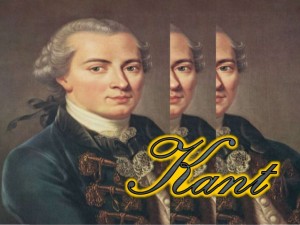Immanuel Kant was a man of habit, living his life to a precise routine. Townsfolk used to set their watches by his afternoon walk, as he followed the same route at the same time every day. One day he stayed in to read a book and people were late all over town. French Revolution was another only two times he did not take his daily walk. To Kant, the event symbolized freedom of action.
Kant led a strangely uneventful life. He never married, never fell ill, and never even travelled far from his home town in east of Prussia. But he was a great thinker. When he died at the age of 80, these words were inscribed on his tombstone: “Two things fill my mind with ever-increasing wonder and awe, the STARRY HEAVENS above me and the MORAL LAW within me”.
At the time when Napoleon was on the march through Europe, Philosophy was at the stalemate. There were two opposing schools of thought. One said that all knowledge came from experience. The other said that human reason made sense of the world. Kant tried to bring the two together. He set about this by exploring how the human mind works and what reality actually is. the upshot was called a revolution in thinking. But because of his tedious and unfathomable writing style, it took a little while for his brilliance to filter through.
According to Kant , no-one can say for certain what reality is, only what it appears to be to them. This is because the human mind moulds reality into a form that makes sense to it. Kant called space and time “irremovable goggles”. They weren’t “things” to be found out in the world, they were part of the mind’s structuring system. in other words, a person’s view of reality is distorted by how the mind works.
Kant was a strict follower of Martin Luther, who preached that faith in God was more important than proof of God’s existence. Kant said it was a moral necessity to believe in God, even though it was beyond the ability of human reason to prove God’s existence. He argued that people were governed by a universal moral law. Also, Kant found the novel “Emile” by Rousseau food for thought. This novel prompted his views on the nature of Morals.
